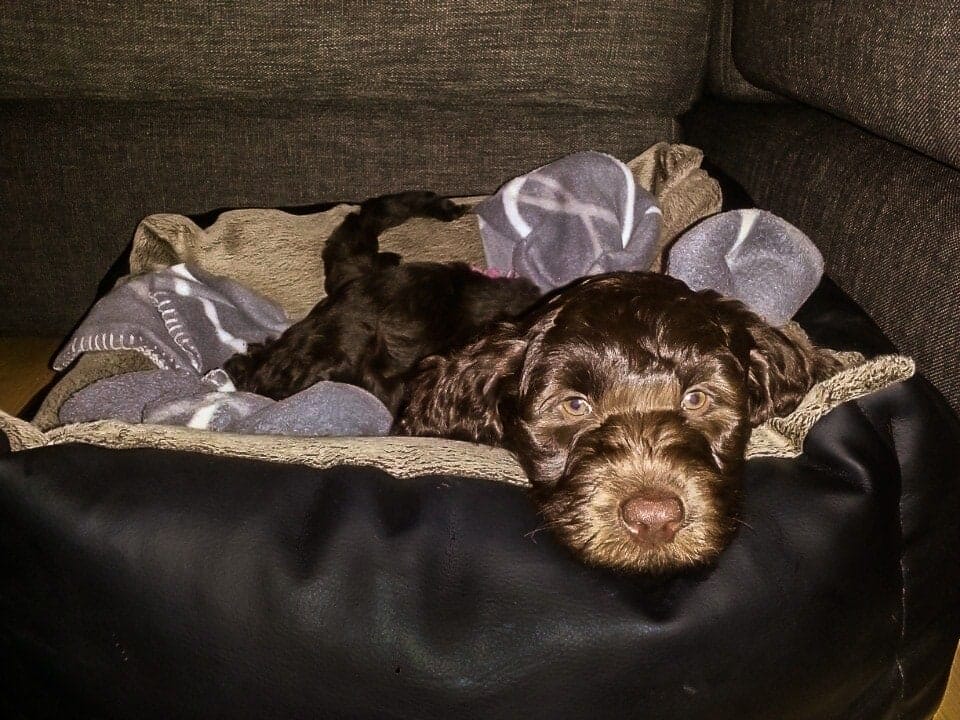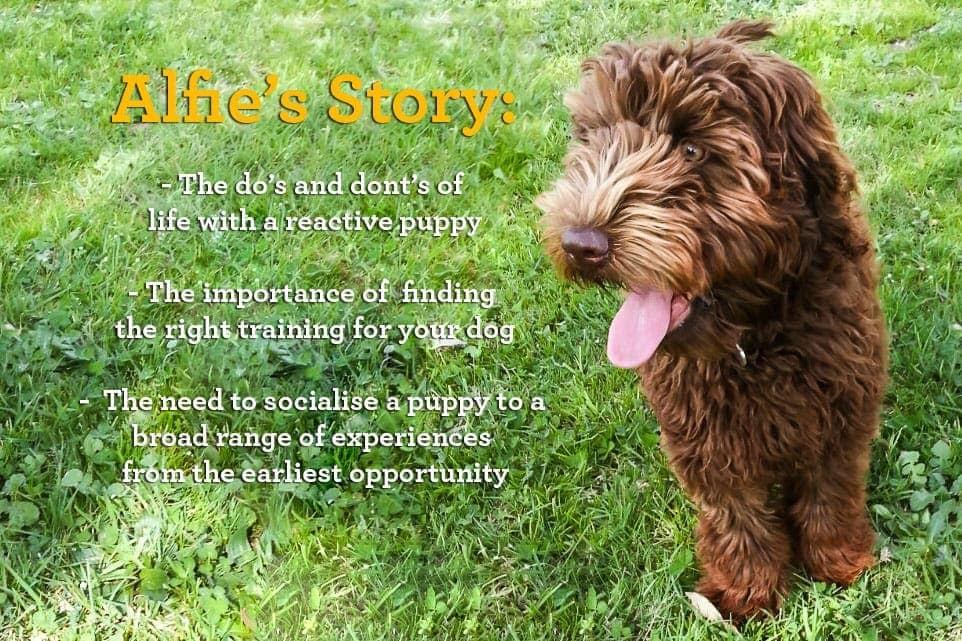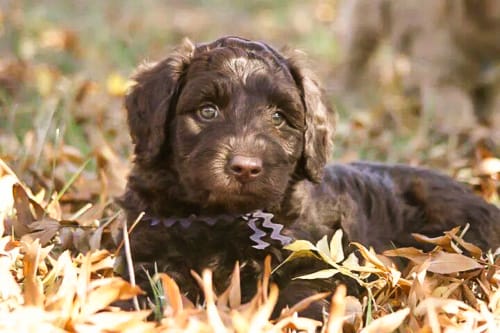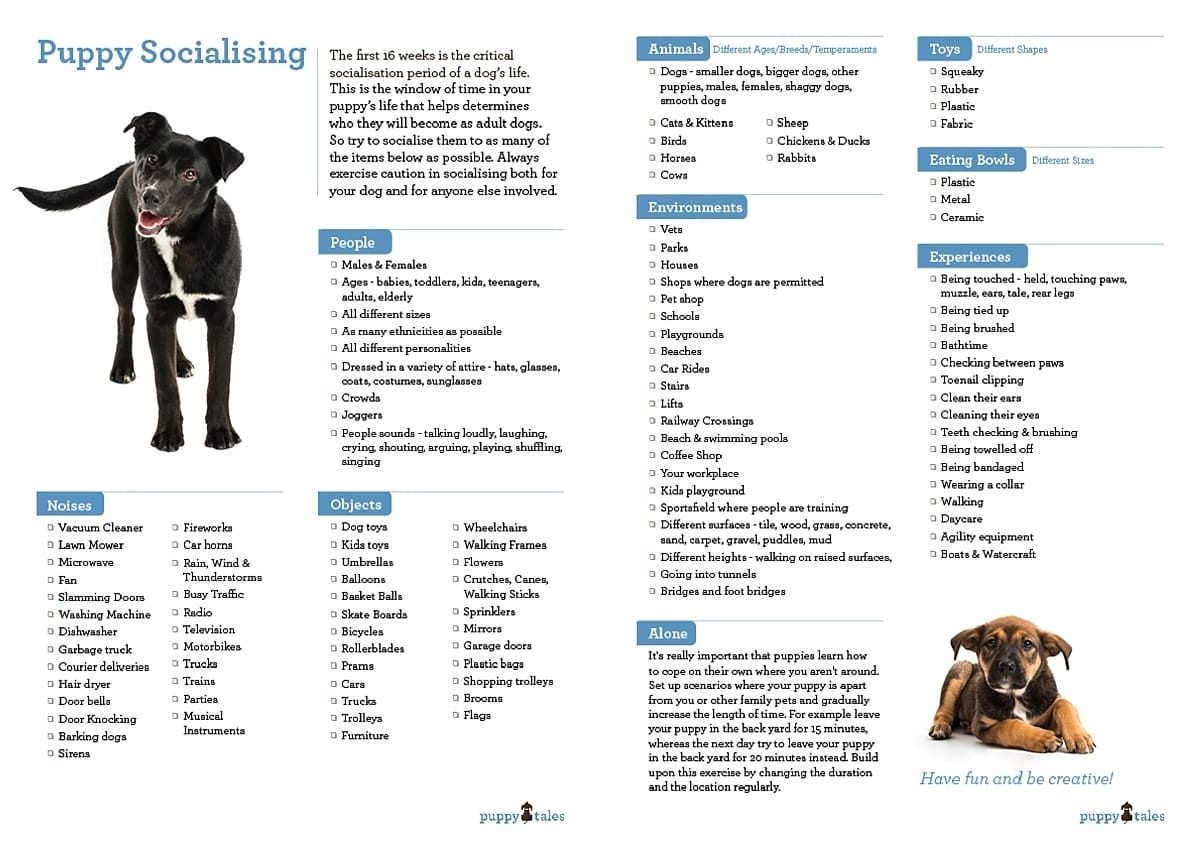Suezanne’s experience with her reactive puppy Alfie led to her becoming a dog trainer and she now helps many dogs (and their people) to reach their potential.
Today she shares Alfie’s story. In doing so, she lets us in on the do’s and dont’s of life with a reactive puppy, highlights the importance of persevering to find the right training for your dog’s needs and reinforces the need to socialise a puppy to a broad range of experiences from the earliest opportunity.
We first met Alfalfa (or Alfie as he is known) our Labradoodle at the age of six weeks. He was a gorgeous choccie colour and we were absolutely smitten! Two weeks later we officially called him ours. We noticed that he was quite shy when he arrived home, however we didn’t make much of this – we were sure it would resolve as he settled in. As time went on though we noticed that he preferred to stick by me and our Schnoodle Pippa. He hadn’t warmed up to my husband Ben, nor any of our friends who visited. Following the usual dog parent path, Alfie attended puppy school. While he did well with the obedience, he was increasingly shy toward people and other dogs. In fact, he started to develop anxious behaviours which lead to aggressive barking at noises, people and dogs.
We consulted our dog trainer at the time for advice as to how we could solve Alfie’s fear aggression. We were told two things, firstly that Alfie would most likely grow out of it. Secondly, if we were really concerned, that we could start Alfie on medication. I couldn’t even imagine giving my 10 month old puppy drugs, possibly for the rest of his life. And the bad news was that Alfie didn’t grow out of it, rather that he grew ‘into it’. It didn’t matter what training advice or tips we implemented, we couldn’t snap Alfie out of his fear barking episodes. We tried treats, toys, being calm, being dominant, being assertive and being soothing but it didn’t matter – nothing could snap him out of it once he got in to his ‘zone’.

Alfie’s behaviour was proving to be quite difficult to manage especially since I was running a dog home boarding business. Not only did he bark at my customers but he barked at their dogs too! Fortunately, through this business, I met a dog trainer whose simple method quickly had an effective result with Alfie. That inspired me to look further into how I could help Alfie.
Shortly after commencing the Lifestyle Canine Communication System training, Alfie could head out on walks again. It was wonderful that he wouldn’t react fearfully to everything we came across. This training method focuses on the fundamental relationship and leadership between owner and dog. And through working together, Alfie, instead of reacting when fearful, started to look to me for guidance and reassurance.
With the benefit of this training and hindsight, I now realise that we had handled his shyness as a puppy wrong. As Alfie’s ‘leader’ I had failed to read his body language and failed to intervene when he wasn’t coping with a situation. Even though I had continued to socialise him with dogs and people, it wasn’t helping because each experience was a negative experience and amplifying his fear response.
Alfie is now doing great in his rehabilitation – he is now far better able to enjoy life including going out for walks, visiting people’s homes and going to the dog park. He occasionally has moments of fear or panic when his environment changes too quickly, however we continue to work on this and improve. As challenging as it has been, my experiences with Alfie have taught me so much. It’s because of him I’m so passionate about educating others on preventative and rehabilitation training. Our dogs rely on us so much and it’s our responsibility to make sure that they grow up and enjoy every single day of their lives.
These are my top ‘Do’s & Don’ts’ with a Reactive Puppy.
DO:
Socialise your puppy from the earliest opportunity
Socialisation is not just about dogs, socialisation includes people, objects, noises, surfaces, anything your dog will encounter in its life. So be creative! Feed them from different bowls, walk them on different surfaces, expose them to different noises, introduce them to different types of people.
I’ve put together a checklist to help get you started:
You may not be able to socialise them as a puppy to everything that they will come across in life but why not make it a challenge to see how many you can check off. Extensive socialisation instils resilience in your puppy. As they grow up, this means that when the environment around them changes, they can cope because they are comfortable with things changing all the time.
Help your puppy cope
Implement measures that allow your dog to overcome their fear. This includes letting others you meet know that you need some help from them and their dog. For example, when Alfie is unsure of a dog, I kindly ask that their dog is keep on a short loose lead as I give them a pat. During this, I give no attention to Alfie and show him that it’s not a big deal. This encourages him to come over on his own accord – it’s important that he makes his own choice to investigate.
Exercise control
It’s very important that you exercise control in all socialising situations. This means only going to places that are suitable for your dog and keeping your dog on lead when you need to. Off lead parks are a bad idea for fearful dogs – you have no control over any of the dogs. And those that come barrelling up to your fearful dog leave them with two options – flight or fight. They can run away (flight) petrified, or they can bark and snarl aggressively (fight) to warn the other dogs not to come near them. Neither are beneficial.
Seek advice
We don’t always have the right or adequate information to help our dogs, so don’t be hesitant to seek advice. There is a lot of advice out there in the dog training world and some of it conflicting. Don’t settle for dog behaviour and training theories that are ineffective for your dog but keep searching until you find something that actually works. I’m also a firm believer in practicing what you preach! If you’re seeking advice from a Trainer that can’t show you how their approach or advice works on a real dog, I’d keep searching.

DON’T:
Make a fuss
This is a hard one! When our dogs are stressed we naturally want to reassure them that everything is ok by patting them or giving them cuddles. Unfortunately this only reinforces to the dog that it is ok to be stressed out. When Alfie gets stressed about a situation I help him cope by modelling what I want him to feel, so instead of making a fuss, I will be calm and act like it’s no big deal. If your dog really isn’t coping, remove them from the situation but don’t make a big fuss about it.
Give them treats when fearful or barking
I was told that every time Alfie growled or barked to give him a treat to distract him so that he would stop. When he was younger he would take the treat but then would resume barking shortly after. When he was a little bit older, he was so fearful that he completely rejected treats altogether. As I started to learn more about dog training, I realised I was reinforcing his barking by giving these treats. Treats for learning tricks are amazing, however it’s better to avoid them when it comes behavioural rehabilitation.
Be afraid to ask for space
It can feel very isolated owning a fearful dog. I was always envious of owners who had confident, happy go lucky dogs that were socialising nicely while mine was growling in the corner. When an excited friendly dog came up to Alfie, I would be too shy to ask the owner to give my dog some space. I thought they would judge me as a bad owner because of my dogs fearful nature. However, now that I’m on the other side I cannot encourage you enough to be brave and kindly ask others to give you space as your dog learns how to cope!
Lose hope
I cannot count how many times I’ve felt like there was no hope for Alfie. When most people get a dog they think about all the exciting adventures they are going to take together. For me I wanted to take Alfie camping, hiking, brunch dates and to the beach. Sadly, for puppy Alfie those adventures were so far from reality because he couldn’t cope with any situation involving noises, people or dogs. I am grateful that I found the right method for Alfie because he deserves the very best in life and it broke my heart that he couldn’t enjoy any of it. Now with training and continued behaviour rehabilitation, he can go on all those amazing adventures…. And he can enjoy them. So don’t lose hope, there is a solution out there.

Suezanne Cheng
Suezanne Cheng is the director of Jericho Dog Training which specialises in prevention & rehabilitation training. She is married to Ben and together they have 3 beautiful fur kids, Pippa (Schnoodle), Alfie (Labradoodle) & Tilly (Wolfhound X). Suezanne believes that there is so much untapped potential in the relationship between owner and dog and is passionate about educating owners on more than just obedience.



